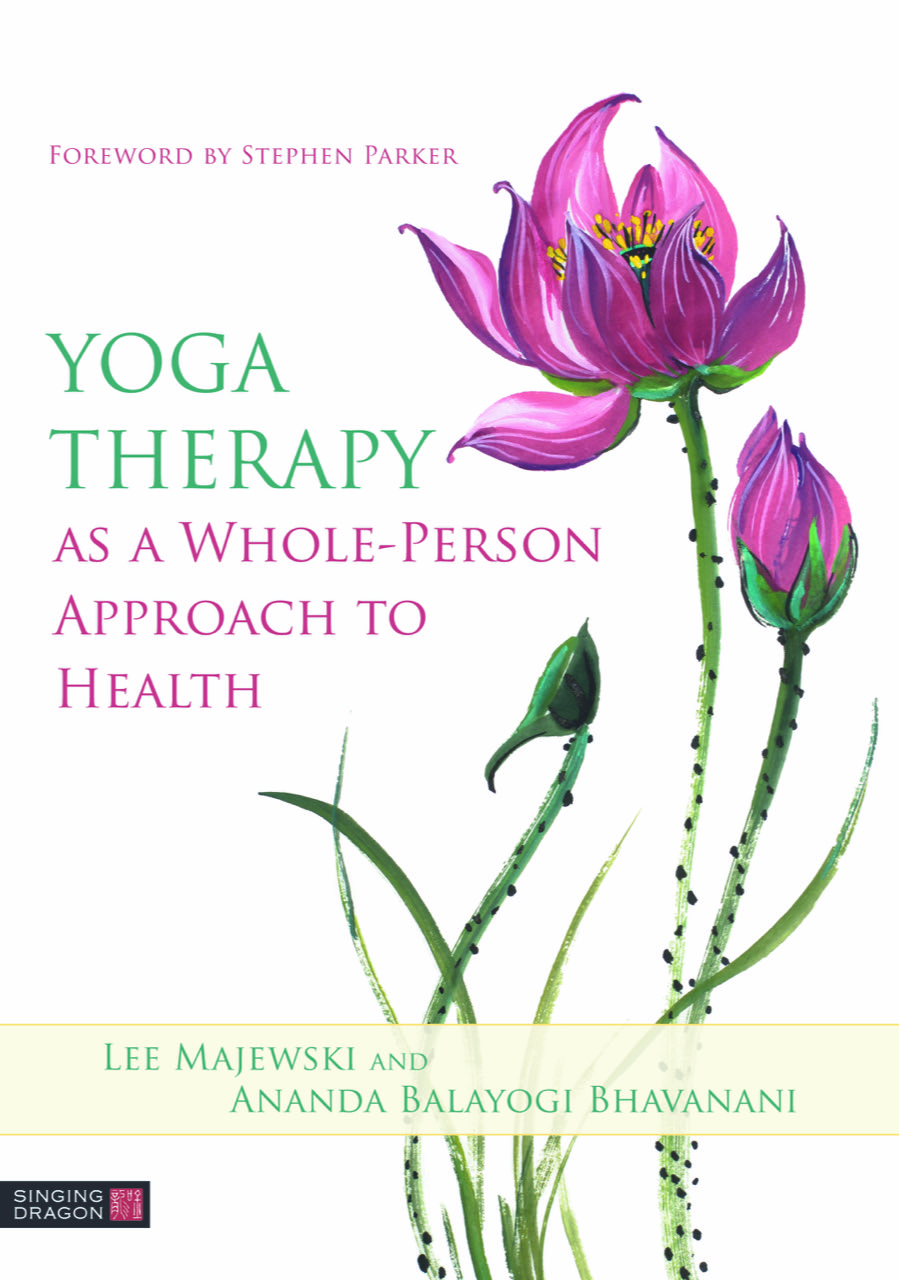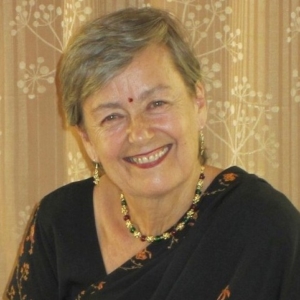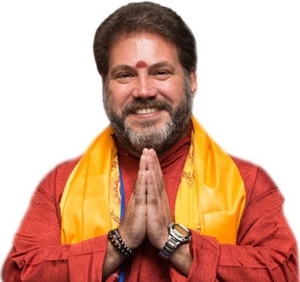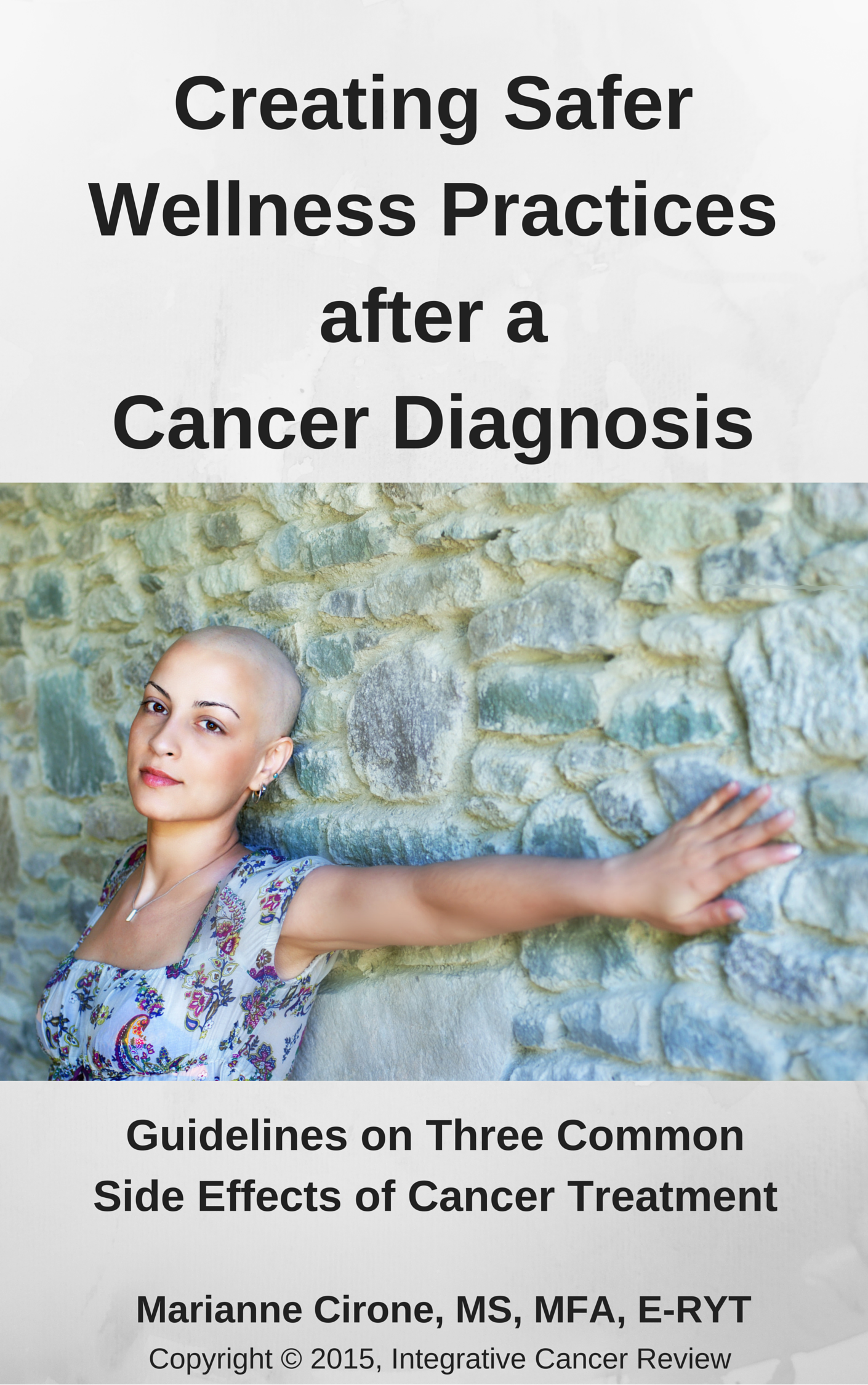
Yoga therapy is a field with tremendous growth and potential in supporting health and wellness, particularly in the area of cancer. We are pleased to feature an interview with Lee Majewski, C-IAYT, co-author of the new book, Yoga Therapy as a Whole-Person Approach to Health by Lee Majewski and Ananda Balayogi Bhavanani.
Can you tell us how you came to write Yoga Therapy as a Whole-Person Approach to Health?
In 2014 I was living and teaching in Kaivallyadhama Yoga Institute in India. I received an invitation to speak at the Symposium of Yoga Therapy and Research in USA. That year I also joined International Association of Yoga Therapists. Since that time, I recognized that yoga therapy is in its infancy. As I attended conferences and looked closer I observed with some concern, the different trends within yoga therapy as an emerging field. Although there are efforts by professional associations to define the scope of the yoga therapy as the ethical profession and build awareness within the membership, there is still a lot of misunderstanding around differences in definitions and practice between yoga teachers and yoga therapists.
 Lee Majewski MA C-IAYT is a long-time yoga teacher and certified yoga therapist and a visiting faculty member of Kaivalyadhāma Yoga Institute, Lonavla, Maharashtra, India. She has private practice in Toronto, Canada.
Lee Majewski MA C-IAYT is a long-time yoga teacher and certified yoga therapist and a visiting faculty member of Kaivalyadhāma Yoga Institute, Lonavla, Maharashtra, India. She has private practice in Toronto, Canada.
Her personal experience of living with her cancer treatment provided the impetus for the design of the retreats described in the book.
She is a frequent presenter in international conferences and has trained many therapists and yoga teachers in the conduct of the retreats.
 Ananda Bhavanani MD is a physician and certified yoga therapist who is also the successor of a venerable yoga lineage through his father, Swāmī Gītānanda Giri and their guru Kanakānanda Bhrigu, more familiarly known by his pre-monastic name as Ram Gopal Majumdar, “the sleepless saint” of Paramahansa Yogānanda’s Autobiography of a Yogi.
Ananda Bhavanani MD is a physician and certified yoga therapist who is also the successor of a venerable yoga lineage through his father, Swāmī Gītānanda Giri and their guru Kanakānanda Bhrigu, more familiarly known by his pre-monastic name as Ram Gopal Majumdar, “the sleepless saint” of Paramahansa Yogānanda’s Autobiography of a Yogi.
Dr. Bhavanani directs a yoga therapy training program, the Center for Yoga Therapy Education and Research of the Śrī Bālāji Vidyāpītha, a deemed university and medical school in Pondicherry in South India.
This confusion came to full light during 2018 SYTAR conference where several respected and seasoned YT spoke in plenary sessions, all attempting to clarify what YT is and is not. One of such speakers happened to be my dear friend Dr. Ananda Bavanani whose presentation brought the listeners to a standing ovation.
I was very happy to hear exactly what I thought should be said and it was then when I decided to ask my friend to co-author this book. Ananda and I already had the loving team spirit from previous collaborations when he started calling me his “Canadian mom.” I knew how in synch we were in our approaches to yoga and YT and I was certain that in this case 1+1 will be much more then 2. And so the team was born!
We both understand that yoga is a vast and deep science and philosophy which escapes any rigid definitions. In turn, yoga therapy is a relational dance between client and yoga therapist, where client must take charge and lead the way. Each relationship is as different as the people involved and thus it escapes any definitions or prescriptions. There is no big enough box or frame to contain the depth and vastness of yoga and yoga therapy. However – our western minds just love to name the things, frame them into boxes and only then we feel comfortable – we think we know! Hence such tendency exists also within yoga therapy emerging field.
Since both Ananda and I belong to the “comprehensive” camp, the book sets out to propose yoga therapy as a multifaceted and holistic approach to human wellness, including the energetic, emotional, mental and spiritual factors with all its ambiguity. Because of my work it has also an extensive chapters on yoga therapy for cancer.
Who do you hope will read Yoga Therapy as a Whole-Person Approach to Health and how do you think it can help them?
In writing this book we both went to great efforts to make this book accessible to all – health professionals, patients, and caregivers, those who never heard about yoga as well as trained yoga teachers and therapists. We use very simple language to explain yogic concepts and philosophy as it relates to healing and so it will be easy read for everyone.
We substantiate all the claims by available research in the field, so that medical health care professional can be assured that the benefits we relate to are tried and true.
We also talk about those healing benefits, which are not measurable in scientific way yet, but which are very evident in our clients’ lives. We are both practicing yoga therapist so we were able to illustrate our claims with many stories of our clients.
Yoga Therapy is an emerging field and there is a lot of education needed for public to understand that this science can be a very effective and powerful complimentary discipline. It can be beneficial in all stages of disease, including palliative care and even before the disease manifests itself. If applied skillfully, it can bring health benefits and well-being to patients with no side effects.
Can you give an overview of yoga therapy and cancer?
In 2006, I was diagnosed with breast cancer and for the next two years went through surgery, chemotherapy and radiation. My body was completely devastated by this ordeal.
I was in a deep depression and with serious cognitive impairment and didn’t even know it. I used yoga throughout the treatment and after to help myself to get out of this dark place.
There is a chapter which describes my cancer journey in detail and how I was able to use yoga to help myself. This chapter is helpful for medical health professional and for caregivers to understand and appreciate what the patient is typically going through internally. It is also helpful for patients to understand that they are not alone, that there are stages of this journey with the light at the end of the tunnel.
My experience working as yoga therapist with cancer patients later on help me to create a chapter on cancers, treatments, application of yoga therapy, what to watch out for and on contraindications. This chapter will be helpful, I hope, to yoga teachers and yoga therapists.
When my treatment was done my oncologist told me “we’ve done everything we could, now go and live your life.” This left me dumbfounded – my body was weak so the point that for every hour of normal activity I had to spend two hours in bed. I couldn’t focus on anything, I couldn’t comprehend or remember simple facts, I would get lost in once familiar neighborhood places not knowing my way home – my brain fog was extreme. Oncologist said – “live your life”, yet I felt I had no life!
Everyone around me said “be happy it is done,” so why did I feel so depressed and helpless?! If this was going to be my life, then I would rather check out for good
Can you share the experience of any of your clients with cancer at your Beyond Cancer yoga retreats?
My own experience made me realize that there was no support for cancer patients in their lowest point in cancer journey after medical treatment. And so I created special yogic three-week residential retreats geared specifically for those who needed lifting up after the treatments.
In the third part of the book, I describe in detail these retreats, what and why we do there, and with what results. We bring in a lot of the stories of our patients describing their experiences of life turned around and regained life energies.
Here is one of such recent stories:
“Through colon cancer journey, I became aware of Beyond Cancer Program. I immediately decided to enroll. I knew instinctively that such a program would bring me lots of help. But what I didn’t know at that time is how much this program will impact my life in the long term for the best.
Beyond Cancer introduced me yoga therapy, which is a set of tools for which we have been taught to be able to practice when I go back home. The tools were composed of specific asanas taking into account my medical condition, breathing techniques, different type of guided meditations and mandalas. In addition, the program helped me to understand the impacts of all the practices on the body and mind. It was very helpful to know and understand the experience of how much these practices will improve our wellbeing.
During my stay, I faced an unexpected significant health issue. I had a pancreatic crisis which is very painful and for which none pain killers are efficient. Desperate, I decided to practice meditation. Then, miraculously, the feeling of pain disappeared. I could not believe it but it was really happening. The pain was gone. It came back 8 hours later and then I did again a longer meditation and again the pain was gone forever.
From that point, my level of motivation skyrocketed and ever since I have been practicing meditation regularly. Sometime I skipped few days but I was always come back to the practice. Meditation is part of my life now and became a strong asset on which I could rely on.
Another tool I considered very powerful was the guided forgiveness meditation. Thanks to this type of meditation, I had been able to make some “cleaning” in my life in order to reach a level of serenity, which I never have had before in my life.
To gain from this program it is essential to be open-minded and to practice. Without practice, you will not be able to transform your life. My life has been far more beautiful since I have been practicing regularly. Yoga therapy brought me more clarity in my life, more determination and more serenity. I feel secure because I know that I have my backup tools to rescue me if I need to.” C.C. 2018
How can people contact you to find out more about your Beyond Cancer yoga retreats and programs?
Please contact Lee Majewski at info@yogaforhealth.institute.
You can find more information on the website: www.yogaforhealth.institute

















